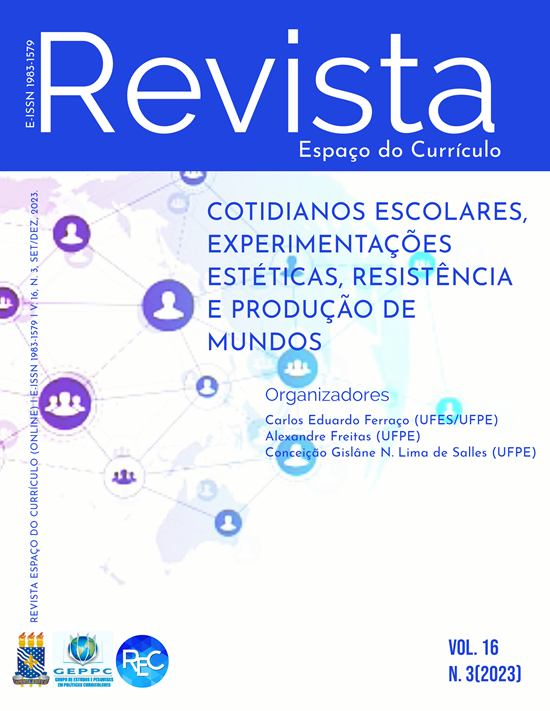THE LONELINESS OF AN EVERYDAY EDUCATION
DOI:
https://doi.org/10.15687/rec.v16i3.68488Keywords:
Everyday life, Curricula, LonelinessAbstract
This text is the result of a thesis production, attempting to problematize the prevailing experiences of loneliness in contemporary education, characterized by notions of lack, melancholy, and precariousness, which confer a negative status to loneliness. Drawing on intercessors such as Deleuze, Guattari, and Nietzsche, it points to alternative ways of considering loneliness within curricula, detached from the understanding of the human being as a weakened subject. It brings curriculum production closer to a "good loneliness, free loneliness, which allows you to continue being good in any sense" (NIETZSCHE, 2005, p. 35), mapping the intensified processes of curriculum production fueled by the power of loneliness as an affirmation of a disrupted life shaped by becomings that compel thought in pursuit of non-subordination. It seeks to highlight the practices of creating unprecedented spaces in the field of curriculum, fostered by loneliness amidst contemporary productive logic in its multiple possible senses within the context of everyday education.
Downloads
Metrics
References
DELEUZE, Gilles. A imanência: uma vida... Revista Educação & Realidade: Faculdade de Educação da UFRGS, Porto Alegre, v. 27, n. 2, jul./dez. 2002. Disponível em: https://seer.ufrgs.br/educacaoerealidade/article/view/31079/19291. Acesso em: 23 mai. 2023.
DELEUZE, Gilles. Conversações. São Paulo: Editora 34, 2013.
DELEUZE, Gilles. Diferença e repetição. Rio de Janeiro: Graal, 2006.
DELEUZE, Gilles. O Abecedário de Gilles Deleuze. 2005. [Entrevista concedida] a Claire Parnet. Transcrição de Bernardo Rieux. Paris: Éditions Montparnasse, Paris. Disponível em: https://clinicand.com/wp-content/uploads/2021/02/Gilles_Deleuze_Claire_Parnet_Abeced_rioz-lib.org_.pdf. Acesso em: 28 out. 2023.
DELEUZE, Gilles. Proust e os signos. 2. ed. Rio de Janeiro: Forense Universitária, 2003.
DELEUZE, Gilles; GUATARRI, Félix. Mil platôs. São Paulo: Editora 34, 2011. v. 1.
DELEUZE, Gilles; GUATTARI, Félix. Mil platôs. São Paulo: Editora 34, 2012a. v. 4.
DELEUZE, Gilles; GUATARRI, Félix. Mil platôs. São Paulo: Editora 34, 2012b. v. 5.
DELEUZE, Gilles; GUATARRI, Félix. O que é a filosofia? São Paulo: Editora 34, 2010.
DELEUZE, Gilles; PARNET, Claire. Diálogos. São Paulo: Escuta, 1998.
FERRAÇO, Carlos Eduardo. Eu, caçador de mim. In: GARCIA, Regina Leite (org.). Método: pesquisa com o cotidiano. Rio de Janeiro: DP&A, 2003, p. 157-175.
LAPOUJADE, David. Deleuze, os movimentos aberrantes. São Paulo: n-1 Edições, 2015.
LARROSA, Jorge. Nietzsche e a educação. Tradução de Veiga, S. G. da. 2. ed., 1. reimp. Belo Horizonte: Autêntica, 2005.
NIETZSCHE, Friedrich. A gaia ciência. Tradução, notas e posfácio de Paulo César de Souza. São Paulo: Companhia das Letras, 2001.
NIETZSCHE, Friedrich. Assim falou Zaratustra. Tradução de Carlos Duarte e Anna Duarte. São Paulo: Martin Claret, 2012.
NIETZSCHE, Friedrich. Humano, demasiado humano. Tradução, notas e posfácio de Paulo César de Souza. São Paulo: Companhia das Letras, 2005.
Downloads
Published
How to Cite
Issue
Section
License
Copyright (c) 2023 Curriculum Space Journal

This work is licensed under a Creative Commons Attribution 4.0 International License.
By submitting an article to Curriculum Space Journal (CSJ) and having it approved, the authors agree to assign, without remuneration, the following rights to Curriculum Space Journal: first publication rights and permission for CSJ to redistribute this article. article and its metadata to the indexing and reference services that its editors deem appropriate.
















